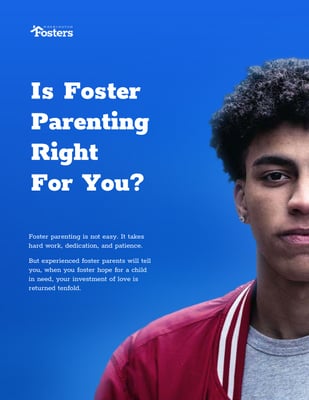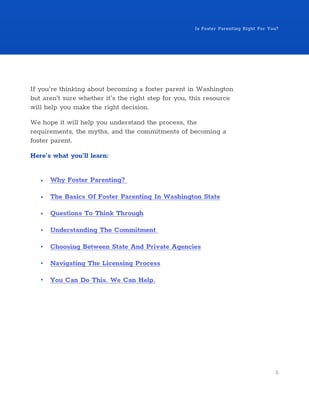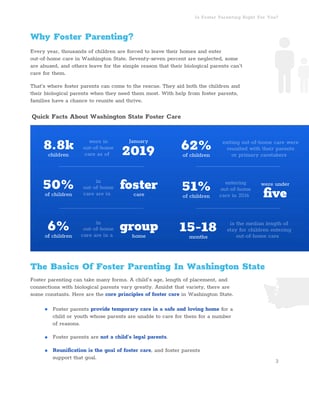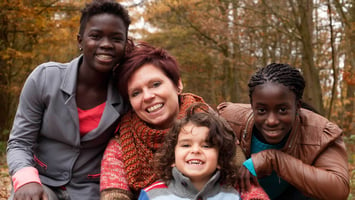Every prospective foster parent is faced with a mountain of things to do. Between researching agencies, going through the licensing process, and learning about the goals of foster care, new foster parents are bound to end up with many questions.
Getting those questions answered is a critical part of your path to becoming a foster parent. We've gathered up six of the most common questions for new foster parents and asked Katie Biron to help us out with the answers specific to Washington State foster care.
Biron is an experienced foster mom with four kids — two of whom were adopted, and one through foster care. Her Family Connections Program aims to improve communication and collaboration between foster parents and biological parents.
1. How do I get started?
"The first step is always to gather as much information as possible," says Biron. One of your earliest decisions is to choose between a state or private agency.
While their licensing requirements are the same, state and private agencies differ by the support resources they provide after you become licensed.
Download Now: Is Foster Parenting Right For You?
Research the pros and cons of state versus private agencies, reach out to several agencies to discuss their services, and ask if they offer orientations or other in-person information sessions.
Other foster families are an incredibly valuable resource. Connect with support groups and experienced foster parents to learn about their experiences and get insight about what it's like to open up your home to a child in need.
2. How long does the licensing process take?
On average, the licensing process in Washington State takes about nine months. Biron cautions new foster parents.
"It's not a quick, quick thing. There are a whole lot of different steps that have to be taken to get you licensed to be a foster family. So go in expecting it to be about a nine-month wait."
3. How long does a family care for a child in foster care?
Biron says, "That can really, really vary." In some instances, children come into care, and get reunited with their parents within a week. Others reunite with extended family members, like an uncle, aunt, or grandparent. And some are in foster care for years. "It's very individual in the case of the family," notes Biron.
4. Is daycare available for foster kids?
Yes, daycare is always available for foster kids. As a registered nurse who worked while she had her foster kids, Biron knows firsthand what's possible when you foster.
She says, "You can work and have foster kids, and the state pays 100% for their childcare. It's up to you to find the childcare provider that will accept the DCYF stipend, but absolutely, 100%. DCYF pays for the daycare, and so you absolutely can foster and work."
5. Do I get to choose which children come into my home?
Yes. During the licensing process, you work with an agency to identify which children would be the best fit in your home.
Age range and gender, and your own experience as a parent or foster parent are a few of the criteria that help find the best homes for kids. For example, Biron notes that she is now only eligible to take infants under a year old because she doesn't have a separate bedroom for another child. In Washington State, every foster child over a year old requires a bedroom separate from adults.
6. Do most kids who come into care end up needing to be adopted?
"I would say no," says Biron. "You need to understand that the goal of the foster care system in Washington State is reunification. The goal is to get the kids home with their parents, and if the kids can't be reunited with their parents, then the next goal is to find a relative who can care for the children."
Even when children are reunited with family, that search process can take a year or longer, which is why foster parents play such a critical role in that child's life.
Biron cautions families that are hoping to adopt, "Foster care is not a cheap way to adopt. But, there are thousands of kids who are legally free. Their parents aren't going to be able to raise them ... So, if that's really where your heart is, to adopt children, there's a whole subset of legally free children looking for homes."
Thinking about becoming a foster parent but not sure what it takes? Download our free guide, Is Foster Parenting Right For You?









